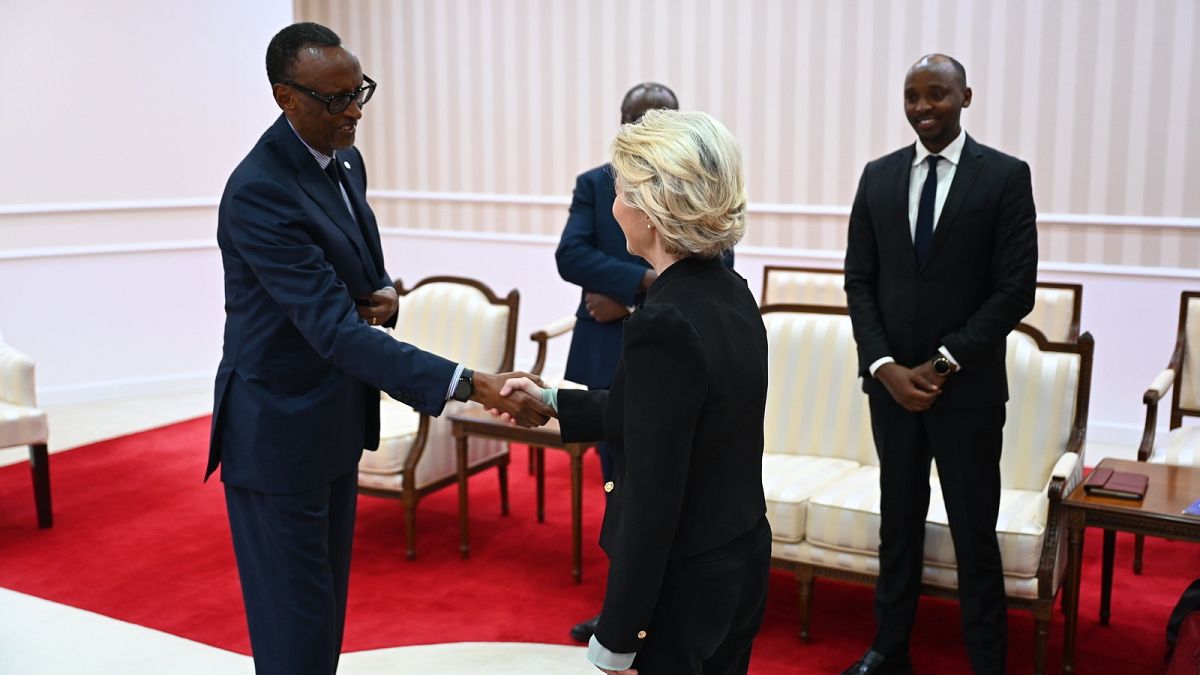EU foreign ministers did not agree to immediately impose sanctions on Rwanda for its alleged role in the escalating conflict in the east of the Democratic Republic of Congo (DRC).
The European Union will reconsider its recent critical raw materials agreement with Rwanda in response to conflict in the east of the Democratic Republic of Congo (DRC), High Representative Kaja Kallas has said.
But the bloc will not follow the US’s lead in sanctioning on Rwandan officials, with EU foreign ministers rather reaching a “political decision” to introduce potential sanctions “depending on the situation on the ground.”
The announcement comes weeks after the Rwandan-backed M23 rebels seized control of DRC territory in the province of North Kivu in late January, before capturing the major city of Goma and expanding their offensive into South Kivu, prompting international condemnation.
Belgium, the former colonial power in DRC, first tabled the suspension of the agreement, with the European Parliament also supporting the move in a recent resolution.
“We have urged Rwanda to withdraw its troops, and the Memorandum of Understanding regarding critical raw materials will be under review,” Kallas told reporters in Brussels on Monday following a meeting of EU foreign ministers.
She added that the EU’s defence and security consultations with Rwanda had also been suspended.
“The situation is very grave and it’s on the brink of regional conflict,” Kallas said. “Territorial integrity is non-negotiable, in Congo (DRC) as well in Ukraine. The UN charter applies everywhere.”
The so-called Memorandum of Understanding signed between Brussels and Kigali in February last year is part of EU efforts to secure the supply of materials used to produce microchips and electric cars.
It’s part of Global Gateway, the EU’s €300-billion infrastructure partnership plan, and is among a raft of similar deals with mineral-rich countries, including the DRC, aimed at reducing dependency on geo-strategic rival China.
More than €900 million of the Global Gateway pot is allocated to Rwanda.
The then-EU chief for international partnerships, Jutta Urpilainen, described the deal as ensuring “sustainable, transparent and resilient value chain of critical raw materials.”
The deal describes Rwanda as a “major player” in global tantalum extraction, and a producer of tin, tungsten, gold and niobium. It also notes the country’s “potential” for extracting lithium – used in batteries of electric cars – and rare earths.
Euronews has asked the European Commission for more details about what the review of the agreeement will entail, but did not receive a response in time for the publication of this article.
While the Memorandum has not yet entered into force, Brussels has faced increasing pressure to suspend the agreement after Rwandan-backed M23 rebels seized control of DRC territory in late January.
The incursion has focused on areas dense with mines for extracting gold, coltan, tin, tantalum and other critical materials and rare earths. Congolese and UN officials have long accused Rwanda of using M23 rebels to seize mines and smuggle minerals out of eastern DRC and into their own supply chains.
“When you look at the geological composition of Rwanda, it’s not possible that they mine what they export,” Guillaume de Brier of the Antwerp-based International Peace Information Service (IPIS), which carries out research on the ground, recently told Euronews, a claim was also made last year by the US Department of State.
Kallas’ announcement marks a shift in the EU’s approach to Rwanda, whose president Paul Kagame is considered to have struck cordial relations with European leaders.
The EU also supports Rwandan forces deployed to address the rising Islamist insurgency in oil-rich Cabo Delgado province in northern Mozambique, allocating an additional €20 million under the so-called European Peace Facility (EPF) last November.
Read the full article here


